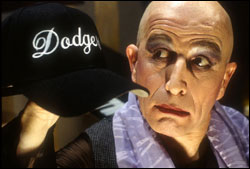FOR ME, AS FOR most of its fans, New York’s famed Theater of the Ridiculous was Charles Ludlam, its founder, dramatist, and star performeror at least so it was until I saw The Artificial Jungle, Ludlam’s dark and steamy stage send-up of classic film noir. Uncharacteristically, Ludlam played a secondary character in Jungle, the pathetic pet-shop owner betrayed by his floozy of a wife. The male lead, a hapless drifter conned into killing the husband, was played by Everett Quinton, Ludlam’s partner and, until Jungle, just another face, however prominent, in the Ridiculous stock company. Quinton’s Zack Scott was a tragic (though still comic) figure, his bewilderment and pain the motor of the drama.
This was something new for the Ridiculous, where the aesthetic impulse had always been to go over the top, and then top thatto push camp so far beyond camp that it turned into a weird mirror image of truth. As the central star round whom his ragtag company turned, Ludlam shone, sometimes blazed. But his radiance was rarely marked by warmthor danger.
For 10 years after Ludlam’s death in 1987, Quinton tried to keep the Ridiculous going, at first by mounting as yet unperformed Ludlam scripts, then, more successfully, by performing shows of his own devising. One such drama, Twisted Olivia, arrives this week at the Empty Space (previews begin Friday, Nov. 28) with Quinton in its leadingand onlyrole. In it, Quinton returns for inspiration to Charles Dickens, who provided the material for his first solo dramatic work.
Seattle Weekly: How did you come to do Dickens in the first place?
Everett Quinton: We were about to open a show by Charles [Ludlam] called Island of the Hermaphrodites, and after the first dress rehearsal, I decided the show just wasn’t any good. So I pulled the plug on it. But we still had to do a show. I’d always been interested in Dickens’ Tale of Two Cities. A friend said, “But Tale of Two Cities isn’t funny!” I said, “How about a one-man version?” He said, “That’s funny.” We’d spent all our money on Hermaphrodites, so we put together the production out of pieces of old shows. And it was a hit.
And that became a kind of model for the new show?
It came to be in sort of the same way. Last year, I was doing Christmas Carol at the McCarter Theater [in Princeton, N.J.] and watching my savings dwindle when I got a call from a friend in Austin: The theater there suddenly had an empty slot in its season and could I fill it? There was no time to reconstruct Tale, so I decided to do the Scheherazade thing again, only with Oliver Twist this time. I based my character on a late drag queen friend named Minette, who used to say she’d never cleaned her house since taking acid in 1963. So the house full of trash becomes the set and props she acts out the story of Oliver Twist with. That’s about it. It all happened so fast, there was no highfalutin notion. It’s just about telling the story, no grand design.
But for laughs?
It’s kind of a puppet show, but I’m not so into it being funnyI want to put across the tragic side. Dickens used to act out Bill Sykes’ murder of Nancy so vividly that women in the audience fainted. He was into the violence, the Grand Guignol of it. And so am I. I grew up in a mad house with insane parents; they did the best they could, but it was still violent. I was just a loser kid from Brooklyn, living my life and trying to figure what’s coming next, when I met Charles on the street in Manhattan. When we became partners, it was just the gift of God for me. The Ridiculous was a home for me, a place to fit in. Absolutely.








